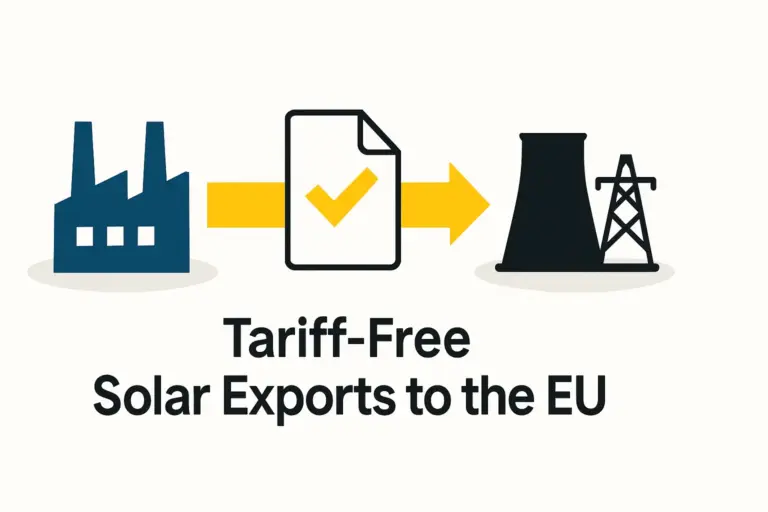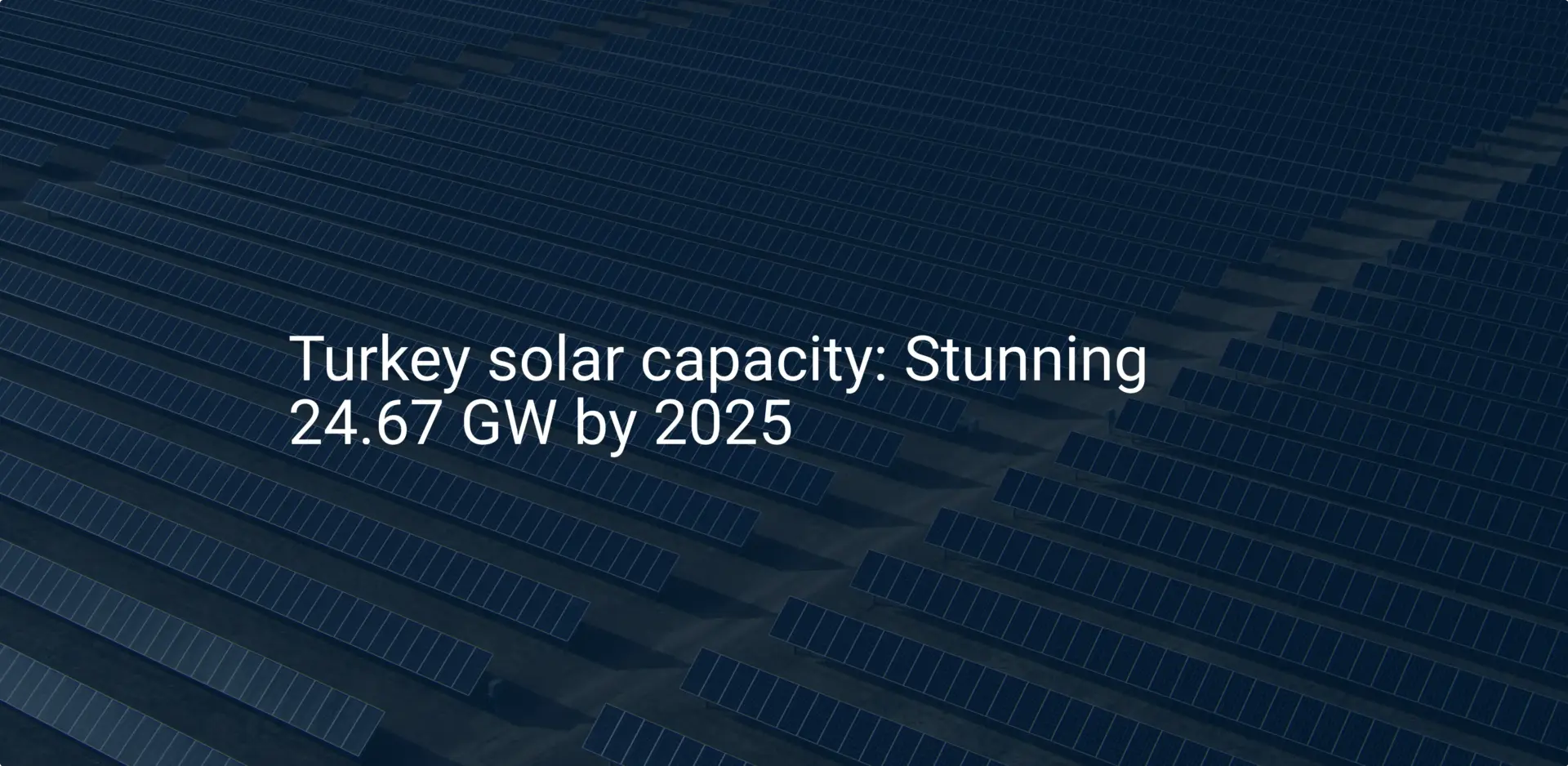For international entrepreneurs exploring new markets for solar module manufacturing, government policy is often the deciding factor between a viable opportunity and a speculative risk. Turkey offers a compelling case in point. With an ambitious goal to reach 52.9 GW of installed solar capacity by 2035 and a net-zero emissions target for 2053, the country has built a sophisticated framework of incentives. Understanding this framework is key to capitalizing on the opportunity.
This article offers a detailed look at two cornerstone policies: the Renewable Energy Resources Support Mechanism (YEKDEM) and the Guarantee of Origin system (YEK-G). It breaks down how these programs function, who is eligible, and what they mean for a prospective photovoltaic (PV) manufacturer looking to enter the Turkish market or its supply chain.
The Foundation: What is YEKDEM?
The Renewable Energy Resources Support Mechanism, or YEKDEM, is a feed-in tariff (FiT) scheme. In simple terms, a feed-in tariff provides a fixed, government-guaranteed price for every kilowatt-hour (kWh) of renewable energy a producer feeds into the national grid. This mechanism de-risks investments in renewable energy projects by ensuring a predictable revenue stream for a set period, typically 10 years.
For an entrepreneur, this policy creates market stability. It guarantees that power plants built with your solar modules will have a reliable buyer for their electricity, which in turn drives consistent demand for the modules themselves.
The Key Incentive for Manufacturers: The Domestic Component Bonus
While the standard YEKDEM tariff supports energy producers, a critical component directly benefits manufacturers. The policy includes a ‘domestic component contribution incentive,’ an additional payment on top of the base feed-in tariff for power plants that use locally manufactured equipment.
This bonus is structured to encourage a complete domestic supply chain for solar module manufacturing. The incentives are tiered based on which components of the solar power plant are produced in Turkey. Using locally made solar panels, inverters, or mounting structures can significantly increase the revenue for the power plant owner.

How it works for a manufacturer:
-
Establish Production: A business establishes a factory in Turkey to produce solar modules or their core components (e.g., solar cells, frames, junction boxes).
-
Certification: The products must be certified as being domestically produced.
-
Market Advantage: Project developers seeking to maximize their revenue under YEKDEM are strongly incentivized to purchase these locally made components to qualify for the bonus payments.
This creates a protected, high-demand market for in-country manufacturers, giving them a clear competitive advantage over imported goods. Experience from J.v.G. turnkey projects in emerging markets shows that such localization incentives are one of the most powerful drivers for establishing a new production facility.

The Current Landscape: A Shift in Policy
The original YEKDEM scheme, which offered prices denominated in U.S. Dollars, concluded for new projects after June 30, 2021. The new YEKDEM mechanism, effective July 1, 2021, brought two significant changes:
-
Currency: Tariffs are now denominated in Turkish Lira (TRY).
-
Inflation Adjustment: Prices include quarterly escalation clauses linked to inflation metrics (Consumer Price Index and Producer Price Index) to mitigate currency fluctuation risks.
This shift indicates a maturing market, moving away from foreign currency pegs toward a system integrated with the local economy. While it introduces new financial variables to model, the fundamental principle of providing a stable, government-backed revenue stream remains.
The Modern Layer: Understanding YEK-G
As renewable energy markets evolve, simple production incentives are often supplemented by systems that track and verify the ‘green’ quality of the energy. In Turkey, this is the role of the YEK-G, or Renewable Energy Guarantees of Origin system.
The YEK-G system functions as a registry for clean energy. For every megawatt-hour (MWh) of renewable electricity produced and supplied to the grid, the producer receives a tradable electronic certificate. This certificate proves that the energy came from a renewable source, such as solar.

Why YEK-G Matters for the Broader Market
The YEK-G certificate is a separate asset from the electricity itself and can be sold to companies or consumers who want to claim their energy consumption is green. This is particularly valuable for:
-
Corporations with ESG Goals: Large national and international companies operating in Turkey need to meet sustainability targets. Purchasing YEK-G certificates is a credible way to report that their operations are powered by renewable energy.
-
Exporters: Businesses exporting goods to markets like the European Union may face carbon border taxes or need to demonstrate a green supply chain. YEK-G certificates provide the necessary documentation.
For a module manufacturer, the YEK-G system reinforces the value of the entire solar ecosystem. It creates a secondary revenue stream for power plant operators and increases the overall financial attractiveness of building new solar projects, ultimately driving more demand for the modules you produce. A robust green certificate market signals a mature and sophisticated renewable energy sector—a positive indicator for long-term investment costs and returns.
YEKDEM vs. YEK-G: A Summary of Key Differences
YEKDEM (Renewable Energy Support Mechanism)
- Primary Function: Provides a guaranteed price (feed-in tariff) for renewable electricity sold to the grid.
- Direct Beneficiary: Renewable energy power plant operators.
- Financial Mechanism: A direct payment per kWh or MWh of electricity generated.
- Impact on Manufacturers: Indirectly creates demand; directly creates a market for locally made components through the domestic content bonus.
YEK-G (Guarantee of Origin)
- Primary Function: Certifies and tracks the renewable origin of electricity, creating a tradable ‘green’ attribute.
- Direct Beneficiary: Renewable energy producers (who receive the certificate) and energy consumers (who buy it).
- Financial Mechanism: A market-based certificate that is traded separately from the electricity itself.
- Impact on Manufacturers: Indirectly strengthens the overall business case for renewable energy, thus driving demand for modules.
Frequently Asked Questions (FAQ)
As a foreign investor, am I eligible to set up a manufacturing plant and benefit from these incentives?
Yes. Turkey’s investment laws are generally favorable to foreign investors. A company established in Turkey, regardless of its owners’ nationality, can produce certified domestic components. The key is ensuring the manufacturing process occurs within the country. Partnering with a consultant experienced in setting up a turnkey production line can help navigate the specific legal and technical requirements for certification.
Are these incentives only for large-scale, utility-sized solar farms?
While large-scale projects, often developed through competitive auctions known as YEKA (Renewable Energy Resource Areas), are a major part of Turkey’s strategy, the YEKDEM and YEK-G mechanisms apply more broadly. They are relevant for a range of project sizes, including commercial and industrial installations, creating a diverse market for solar modules beyond just massive solar parks.
How stable are these government policies?
Turkey has demonstrated a long-term commitment to expanding its renewable energy capacity as a matter of national energy security and economic strategy. While the specifics of the support mechanisms have evolved (e.g., the shift from USD to TRY), the overarching policy direction has remained consistent. This institutional commitment provides a degree of stability for long-term investment planning.
Does my manufacturing facility need to produce the entire solar panel from scratch to qualify for the domestic component bonus?
Not necessarily. The domestic content incentive is often tiered. For example, assembling modules using imported cells but with locally manufactured frames, glass, and junction boxes would typically qualify for a portion of the bonus. A facility that also manufactures the solar cells in-country would qualify for a higher tier. The goal is to encourage progressive vertical integration within the Turkish solar industry.
Conclusion: A Market Structured for Growth
Turkey’s YEKDEM and YEK-G programs are more than just subsidies; they are integral parts of a deliberate industrial strategy. For the prospective solar module manufacturer, they create a clear and compelling business case.
- YEKDEM builds a foundational, stable demand for solar power plants.
- The domestic component bonus provides a direct and significant market advantage for local producers.
- YEK-G adds a modern, market-based layer that increases the overall value of solar energy and aligns the industry with global corporate sustainability trends.
Understanding the mechanics of these incentives reveals that Turkey is not just a market to sell to, but a strategic location to produce from. The government has effectively laid out a roadmap for investment, and for those with the right guidance and technical expertise, it is a roadmap that leads directly to opportunity.






